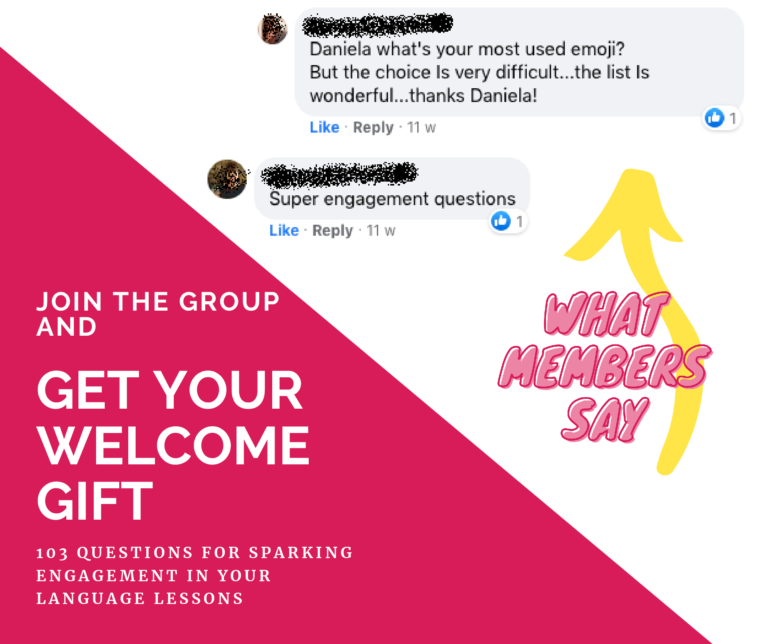
Getting your beginner level students to speak seems to be a mission only if you haven’t got a clue of how to teach speaking English to beginners. Method is king. In this article you are going to learn the basic steps for walking your beginner students through their first approach to speaking a foreign language.
Teaching speaking skills to intermediate or advanced language students is relatively easy. Many teachers may get stuck when it comes to planning lessons aiming at getting their students to speak, where the students are beginners.
The truth is that many language teachers take it for granted their beginner students can’t actually take part in a conversation because of the lack in vocabulary and knowledge of the grammar. Well, that is a myth.
In my teaching practice, I get beginner level students (as well as complete beginner level students) to speak from the very first lesson. I can guarantee I’m not a magician! Ah-ah-ah J On the contrary, I stick to a precise method and I keep on practising it with as many students as possible.
In this article I want to share with you the essential aspects of that practice, so that you can give it a go with your beginner students. This is based on my experience as a language teacher, specifically as a suggestopedic language teacher. In this sense, Suggestopedia has a lot of tools that can help you to get clear on how to teach speaking English to beginners (English, as well as any other foreign language).
Here are the questions you are going to find answer:
- How do you teach speaking skills to beginners?
- What are the strategies of teaching speaking skills to beginners?
- What results can you reasonably expect from beginners?
- What are the best exercises or activities for teaching speaking skills to beginners?
Let’s get started.
How do you teach speaking skills to beginners?
It’s all a matter of bearing in mind what is really central in the communication process. What do you think is it the most important thing in developing speaking skills? To me, the most important thing is delivering a message. That is the true end game.
Delivering a message means communicating something meaningful to someone else in order to get feedback in return.
As a consequence, the priority in your teaching practice with beginners should always be creating tons of opportunities for delivering messages. This means creating the urgency and the need to pass on a message, regardless of the content.
Now, when you work with beginners and complete beginners, the core topics in the lessons are usually related to being able to talk about oneself: who are you? Where are you from? Your family? What do you like and dislike? And so on. Therefore, with beginners the priority will be to create as many opportunities as possible to talk about those topics.
By “as many opportunity as possible” I mean that you would be supposed to get the students into the conversation from the very first lesson, regardless of their previous knowledge of the target language. Remember: communicating in a foreign language means delivering a message by using any means. The means can be: words students already know, body language and gestures, pictures and drawings. Really, anything.
For example, in my suggestopedic Italian courses for beginners I do a specific activity called introduction. That is the very first part of the suggestopedic courses. There I have a conversation with my students, where I speak Italian right away and I constantly invite them to give me feedback, to answer, to talk, depending on the specific previous knowledge of each student. Also, I use a lot of props and visuals (pictures, objects) to show the things I’m talking about. So, for instance: if I’m talking about my family, I show them a picture of my family so that they can link the nouns belonging to that conversational topic to real pictures.
What are the strategies of teaching speaking skills to beginners?
The key strategies are the following ones:
- Bearing in mind what the end game is: delivering a message
- Encouraging the students to speak and to take part in conversations from the very beginning of your courses
- Creating as many opportunities as possible for speaking: students ought to get CONSTANTLY involved in activities that create the urgency for delivering a message and interacting with others
- Using a lot of visuals and props as a concrete support
- Communicating through your body language, along with the words you speak
- Speaking the target language only, switching to the students’ language only when needed (the goal is to getting them used to the target language without generating stress!).
That is all you need to implement while you learn how to teach speaking English to beginners.
What results can you reasonably expect from beginners?
Let’s talk about your expectations, now. This is where the majority of the language teachers fail when they deliver language lessons for beginners: many teachers think beginner level students can’t really take part in proper conversations because they know too little. As a consequence, they reduce the speaking activities and they focus their lessons mainly on grammar and vocabulary. They forget one important thing: the urgency for communicating a message, which is equal to any other higher level students. Instead, what should be different on the teachers’ side is their expectations. When beginners get involved in speaking activities, their outcome will be basic for obvious reasons. This doesn’t mean, though, the students can’t experience the urgency for speaking, telling more and asking the others. The role of the teacher here is to spot any possible chance that may trigger the need for saying one more sentence or for asking a groupmate for a question.
If the conversation with beginners is predictably basic, that doesn’t mean it can’t be dynamic. On the contrary, it can be dynamic, as long as the teacher supports and facilitates it at every moment.
What are the best exercises or activities for teaching speaking skills to beginners?
It’s true that beginners have little knowledge of the target language and, therefore, they can’t hold long conversations. Nevertheless, what we could do is to replace the conversation time with other speaking exercises designed for introducing or for practising new vocabulary or new grammar structures. Here is an example. Let’s suppose you have your students listen to a dialogue. Once they analyse the dialogue, you want them to speak about themselves by following the original dialogue structure as an example. The students’ outcome will be presumably not sophisticated. That outcome, though, can be amplified and expanded. For example: a dialogue written for beginners could be the starting point for a short theatrical scene, a role play, a group exercise where the students map out all the words showing in the dialogue and then they find synonyms or antonyms, a creative writing exercise where they re-write the dialogue but they change the context, and so on. All those exercises work as long as the teacher is there with an extra question, with an extra encouragement to telling more.
Hence, you can propose any types of exercises, as long as you use them for creating opportunities for speaking a bit more.
Learning how to teach speaking English to beginners may be challenging. Therefore, I want to suggest a collection of speaking exercises: Beginner’s Communication Games by Hadfield and Jill.
Wrapping up
The answer to the question how to teach speaking English to beginners is easier than many teachers think. There is a handful of strategies that should become part of your teaching practice (see them above). Bear in mind, anybody can communicate and speak as long as he/she is motivated to do it and experience the urgency to take part in the interaction.
I like to remind the language teachers I train: on the one hand do not expect the students to speak for hours, on the other hand do not underestimate their need to deliver the message. In the urgency they will find a way to make themselves understood – by all means.
Want more support?
Join the Facebook group Independent Language Teachers Collective to get daily advice, tons of free training and to branch out with other independent language teachers like you!
ALSO…
Available only for the Collective members: free list 103 question for sparking engagement in your language lessons.
This is what members say about the freebie:

Join in the Collective and grab your welcome gift:


